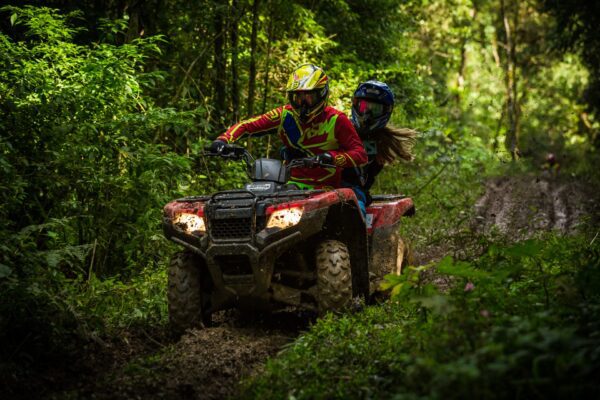
ATVing is one of the country’s more popular pastimes. With it comes a responsibility by every driver to prevent ATV accidents from occurring. With a significant decrease in ATV-related emergency department-treated injuries from 2017 to 2018: dropping from an estimated 93,800 in 2017 down to 81,800 in 2018.
In Maine, safety and responsibility go hand-in-hand in preventing ATV accidents. ATVing is widely popular throughout the state, in large part due to Maine’s fantastic trail system. It’s an excellent way to stay active throughout the spring, summer, and fall. On an ATV, it’s easy to ride into the wilderness and enjoy the Maine outdoors. Nevertheless, obeying safety precautions is essential for every rider.
The rules of the road are mostly common sense. ATVs are large, heavy machines. The center of gravity is high. Combine that with speed and driving over or through all kinds of terrain; it’s understandable why some drivers can lose control of their ATV. Injuries resulting from ATV accidents range from cuts and scrapes, broken arms, legs, or collarbones to internal trauma and head and neck injuries.
Safety cannot be 100% guaranteed while ATVing, but you can reduce the risk of injury by following a few safety tips.
5 Safety Measures to Consider Before ATVing
Dress for the trails
Wearing the right clothing and protective equipment is common sense. Riding in tank tops, shorts, and sandals is not advisable. Trail riding can stir up gravel, debris, and muck—enough to interfere with the most seasoned driver. Riders should dress for the trails by wearing long pants and sleeves, gloves, and boots.
The right safety equipment can also limit the severity of injury in the event of an accident. Riders of all ages should always have eye protection and wear a helmet. In Maine, persons under 18 years old cannot operate or be passengers on an ATV without protective headgear.
Choose the right size and type of ATV
There are many size ATVs on the market, ranging from small child-sized models to full-size models for advanced skill levels. ATVs for sport performance purposes are different from those for general recreation or utility (UTV) purposes. ATVs designed for young teenagers have better control and handling, as well as a speed limit.
Never drive an ATV under the influence of alcohol or drugs
As with any vehicle, driving under the influence of alcohol or drugs is illegal and dangerous. Riding an ATV often involves quick decision-making that requires shifting weight, slowing down, or changing directions. Drugs and alcohol impair judgment, reflexes, and interferes with the senses, all of which are necessary for a driver to have the ability to make responsible decisions in a fraction of a second.
ATV safety courses
Safety courses can teach ATV drivers of all ages and skill levels how to ride an ATV safely. Training will teach drivers the necessary skills to handle an ATV through the many different obstacles they may encounter on the trails. The Maine Department of Inland Fisheries and Wildlife offers an education course that not only teaches how to operate and maintain an ATV properly, but the laws, responsibilities, and personal safety essential to driving an ATV.
Limit riding to daylight hours
ATVing over uneven or rough terrain can be trying enough in the daylight. Reaction to an unexpected pothole or obstacle is critical in avoiding a spill or damage to the ATV. At the very least, during the daytime, riders have a chance to react, whereas, at night, there may not be enough time to slow down or steer around them. Even with the best headlight, the shadows cast across a trail can lead drivers to misjudge terrain, leading to an accident. Even if there are no injuries, would you want to walk for miles in the wilderness in the middle of the night?
ATV Accidents and Negligence
ATV driving is a fun pastime enjoyed by many Mainers. With that fun comes a great deal of responsibility to prevent accidents and injuries. If you are injured in an ATV accident due to someone else’s negligence or defective product or protective wear, contact the law firm of Hardy, Wolf & Downing, for a free consultation. Over the years, they’ve helped thousands of Mainers secure the monetary damages they deserve to allow them to recover from their injuries and move on with their lives.

